Cultural Competence in Early Childhood Education and Care Report
VerifiedAdded on 2021/10/01
|16
|3331
|206
Report
AI Summary
This report provides a detailed analysis of cultural competence and ethical considerations within the context of early childhood education and care in New South Wales (NSW). It explores the requirements for cultural awareness and competence among early childhood teachers, emphasizing the importance of understanding and respecting diverse cultural backgrounds. The report delves into professional conduct, ethical responsibilities towards families, colleagues, and communities, highlighting the significance of family partnerships and the role of teachers in fostering positive learning environments. Furthermore, it examines significant cultural awareness practices and protocols for working with Aboriginal communities, including the importance of building relationships and using appropriate communication. The report also provides recommendations and a conclusion, emphasizing the need for continuous improvement in early childhood education practices. Desklib offers this and similar resources, including past papers and solved assignments, to assist students in their studies.
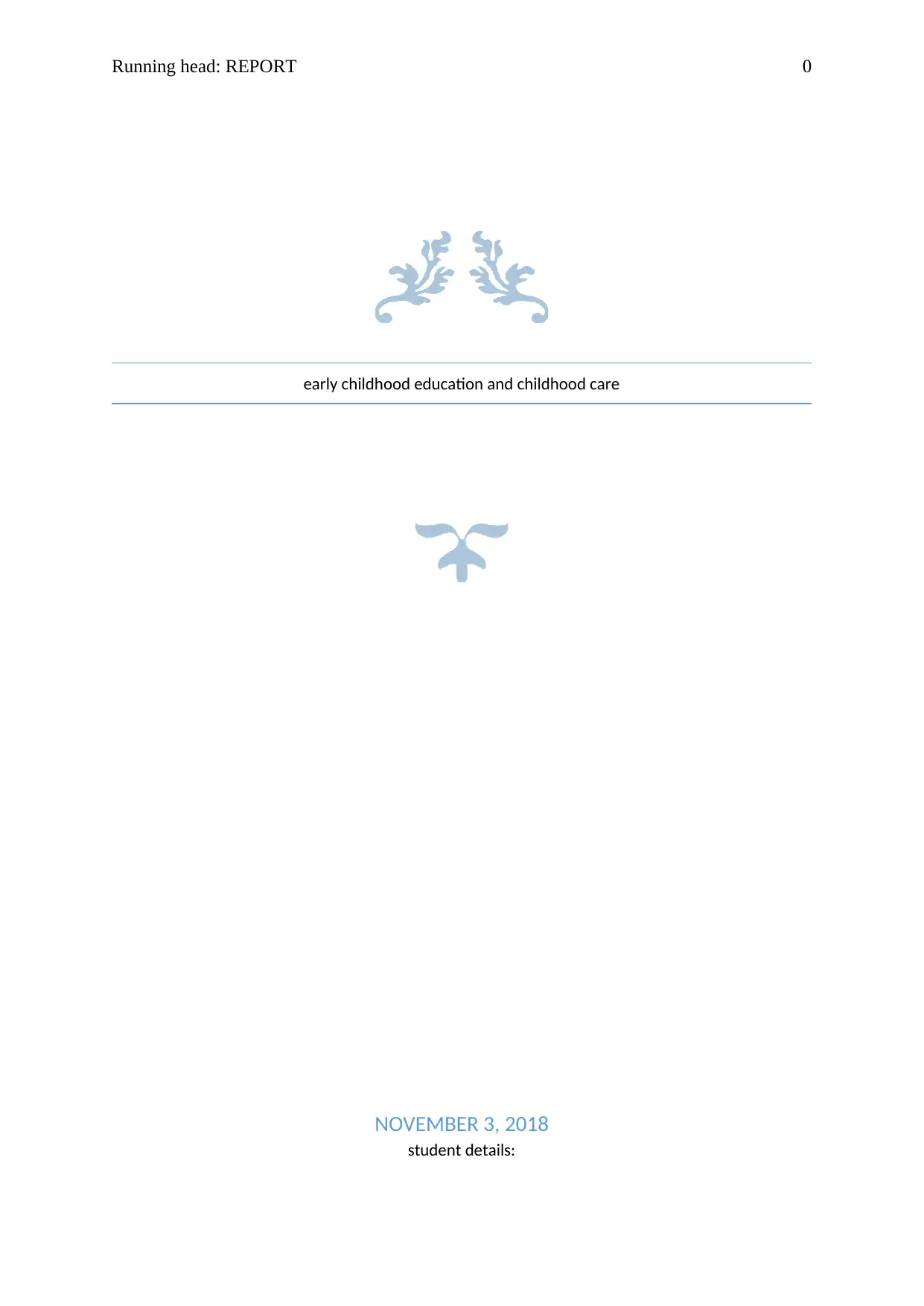
Running head: REPORT 0
early childhood education and childhood care
NOVEMBER 3, 2018
student details:
early childhood education and childhood care
NOVEMBER 3, 2018
student details:
Paraphrase This Document
Need a fresh take? Get an instant paraphrase of this document with our AI Paraphraser
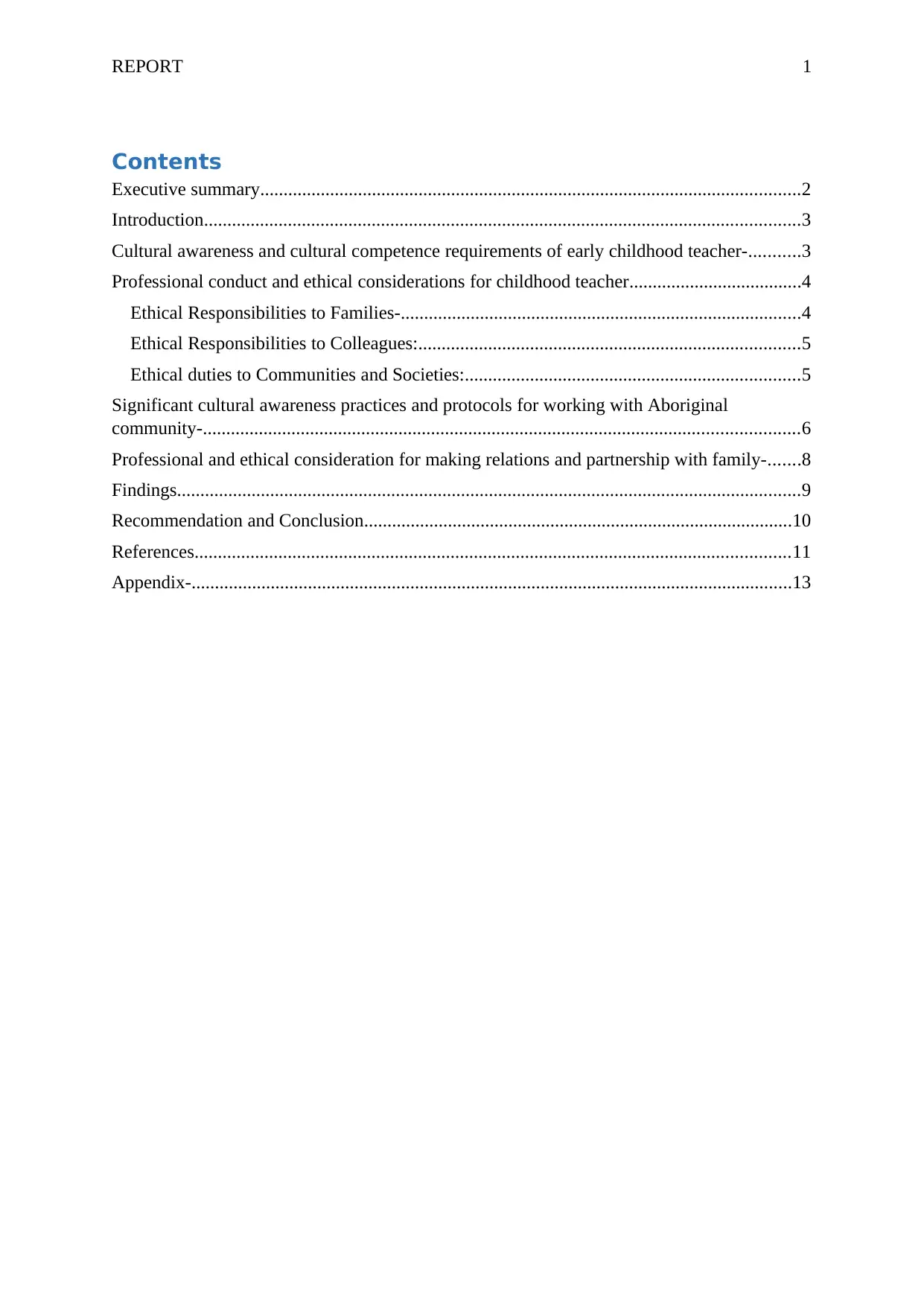
REPORT 1
Contents
Executive summary....................................................................................................................2
Introduction................................................................................................................................3
Cultural awareness and cultural competence requirements of early childhood teacher-...........3
Professional conduct and ethical considerations for childhood teacher.....................................4
Ethical Responsibilities to Families-......................................................................................4
Ethical Responsibilities to Colleagues:..................................................................................5
Ethical duties to Communities and Societies:........................................................................5
Significant cultural awareness practices and protocols for working with Aboriginal
community-................................................................................................................................6
Professional and ethical consideration for making relations and partnership with family-.......8
Findings......................................................................................................................................9
Recommendation and Conclusion............................................................................................10
References................................................................................................................................11
Appendix-.................................................................................................................................13
Contents
Executive summary....................................................................................................................2
Introduction................................................................................................................................3
Cultural awareness and cultural competence requirements of early childhood teacher-...........3
Professional conduct and ethical considerations for childhood teacher.....................................4
Ethical Responsibilities to Families-......................................................................................4
Ethical Responsibilities to Colleagues:..................................................................................5
Ethical duties to Communities and Societies:........................................................................5
Significant cultural awareness practices and protocols for working with Aboriginal
community-................................................................................................................................6
Professional and ethical consideration for making relations and partnership with family-.......8
Findings......................................................................................................................................9
Recommendation and Conclusion............................................................................................10
References................................................................................................................................11
Appendix-.................................................................................................................................13
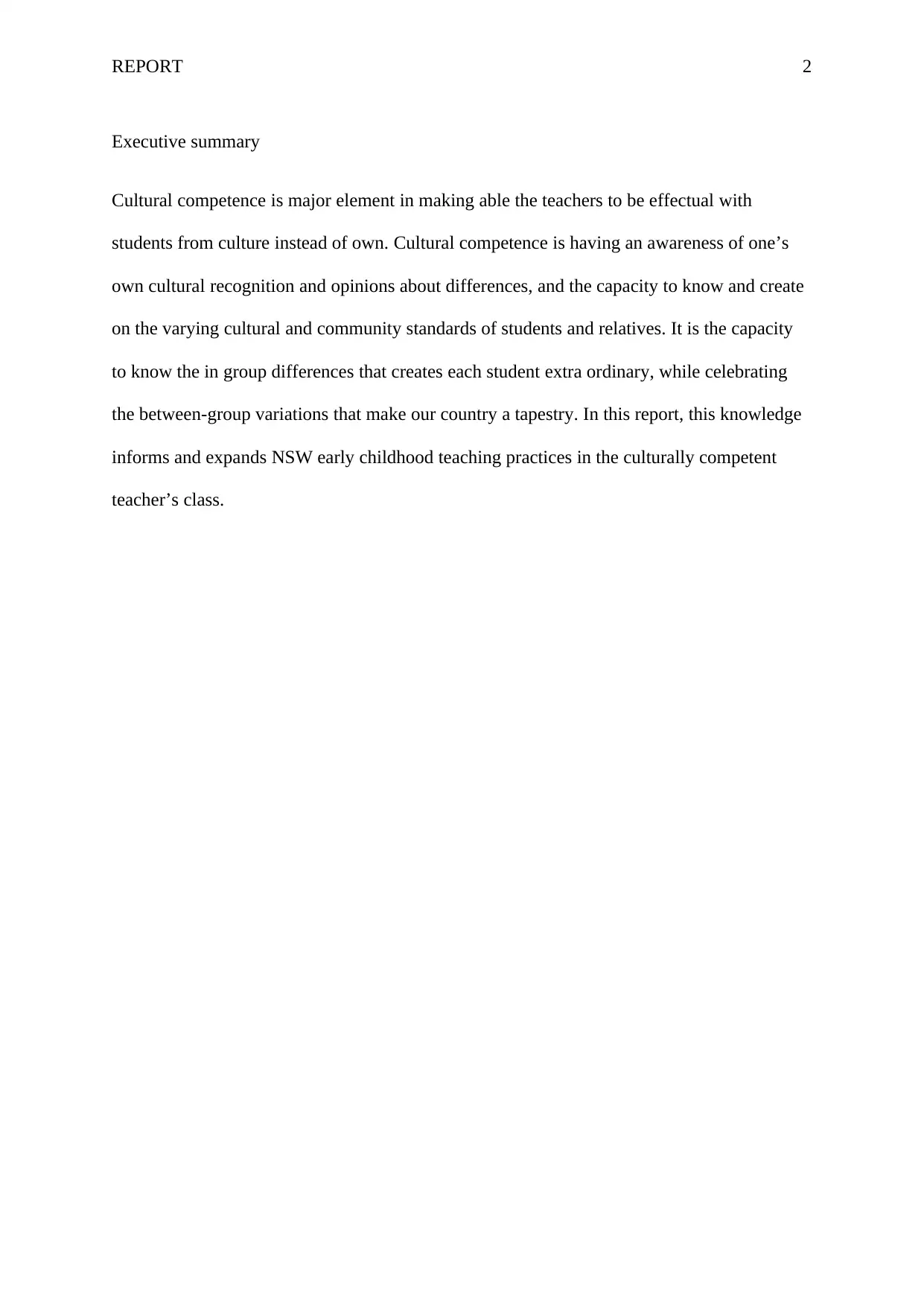
REPORT 2
Executive summary
Cultural competence is major element in making able the teachers to be effectual with
students from culture instead of own. Cultural competence is having an awareness of one’s
own cultural recognition and opinions about differences, and the capacity to know and create
on the varying cultural and community standards of students and relatives. It is the capacity
to know the in group differences that creates each student extra ordinary, while celebrating
the between-group variations that make our country a tapestry. In this report, this knowledge
informs and expands NSW early childhood teaching practices in the culturally competent
teacher’s class.
Executive summary
Cultural competence is major element in making able the teachers to be effectual with
students from culture instead of own. Cultural competence is having an awareness of one’s
own cultural recognition and opinions about differences, and the capacity to know and create
on the varying cultural and community standards of students and relatives. It is the capacity
to know the in group differences that creates each student extra ordinary, while celebrating
the between-group variations that make our country a tapestry. In this report, this knowledge
informs and expands NSW early childhood teaching practices in the culturally competent
teacher’s class.
⊘ This is a preview!⊘
Do you want full access?
Subscribe today to unlock all pages.

Trusted by 1+ million students worldwide
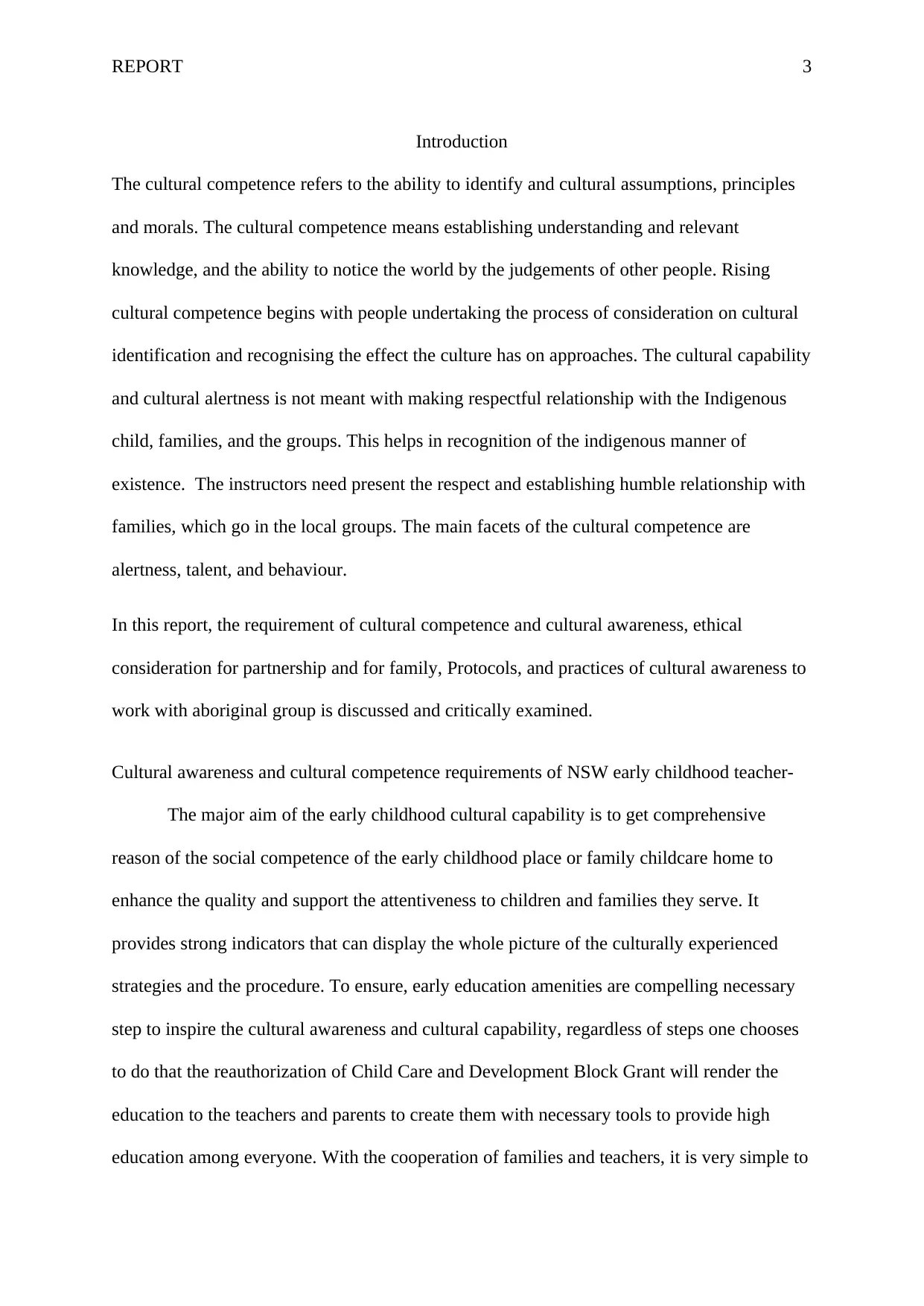
REPORT 3
Introduction
The cultural competence refers to the ability to identify and cultural assumptions, principles
and morals. The cultural competence means establishing understanding and relevant
knowledge, and the ability to notice the world by the judgements of other people. Rising
cultural competence begins with people undertaking the process of consideration on cultural
identification and recognising the effect the culture has on approaches. The cultural capability
and cultural alertness is not meant with making respectful relationship with the Indigenous
child, families, and the groups. This helps in recognition of the indigenous manner of
existence. The instructors need present the respect and establishing humble relationship with
families, which go in the local groups. The main facets of the cultural competence are
alertness, talent, and behaviour.
In this report, the requirement of cultural competence and cultural awareness, ethical
consideration for partnership and for family, Protocols, and practices of cultural awareness to
work with aboriginal group is discussed and critically examined.
Cultural awareness and cultural competence requirements of NSW early childhood teacher-
The major aim of the early childhood cultural capability is to get comprehensive
reason of the social competence of the early childhood place or family childcare home to
enhance the quality and support the attentiveness to children and families they serve. It
provides strong indicators that can display the whole picture of the culturally experienced
strategies and the procedure. To ensure, early education amenities are compelling necessary
step to inspire the cultural awareness and cultural capability, regardless of steps one chooses
to do that the reauthorization of Child Care and Development Block Grant will render the
education to the teachers and parents to create them with necessary tools to provide high
education among everyone. With the cooperation of families and teachers, it is very simple to
Introduction
The cultural competence refers to the ability to identify and cultural assumptions, principles
and morals. The cultural competence means establishing understanding and relevant
knowledge, and the ability to notice the world by the judgements of other people. Rising
cultural competence begins with people undertaking the process of consideration on cultural
identification and recognising the effect the culture has on approaches. The cultural capability
and cultural alertness is not meant with making respectful relationship with the Indigenous
child, families, and the groups. This helps in recognition of the indigenous manner of
existence. The instructors need present the respect and establishing humble relationship with
families, which go in the local groups. The main facets of the cultural competence are
alertness, talent, and behaviour.
In this report, the requirement of cultural competence and cultural awareness, ethical
consideration for partnership and for family, Protocols, and practices of cultural awareness to
work with aboriginal group is discussed and critically examined.
Cultural awareness and cultural competence requirements of NSW early childhood teacher-
The major aim of the early childhood cultural capability is to get comprehensive
reason of the social competence of the early childhood place or family childcare home to
enhance the quality and support the attentiveness to children and families they serve. It
provides strong indicators that can display the whole picture of the culturally experienced
strategies and the procedure. To ensure, early education amenities are compelling necessary
step to inspire the cultural awareness and cultural capability, regardless of steps one chooses
to do that the reauthorization of Child Care and Development Block Grant will render the
education to the teachers and parents to create them with necessary tools to provide high
education among everyone. With the cooperation of families and teachers, it is very simple to
Paraphrase This Document
Need a fresh take? Get an instant paraphrase of this document with our AI Paraphraser
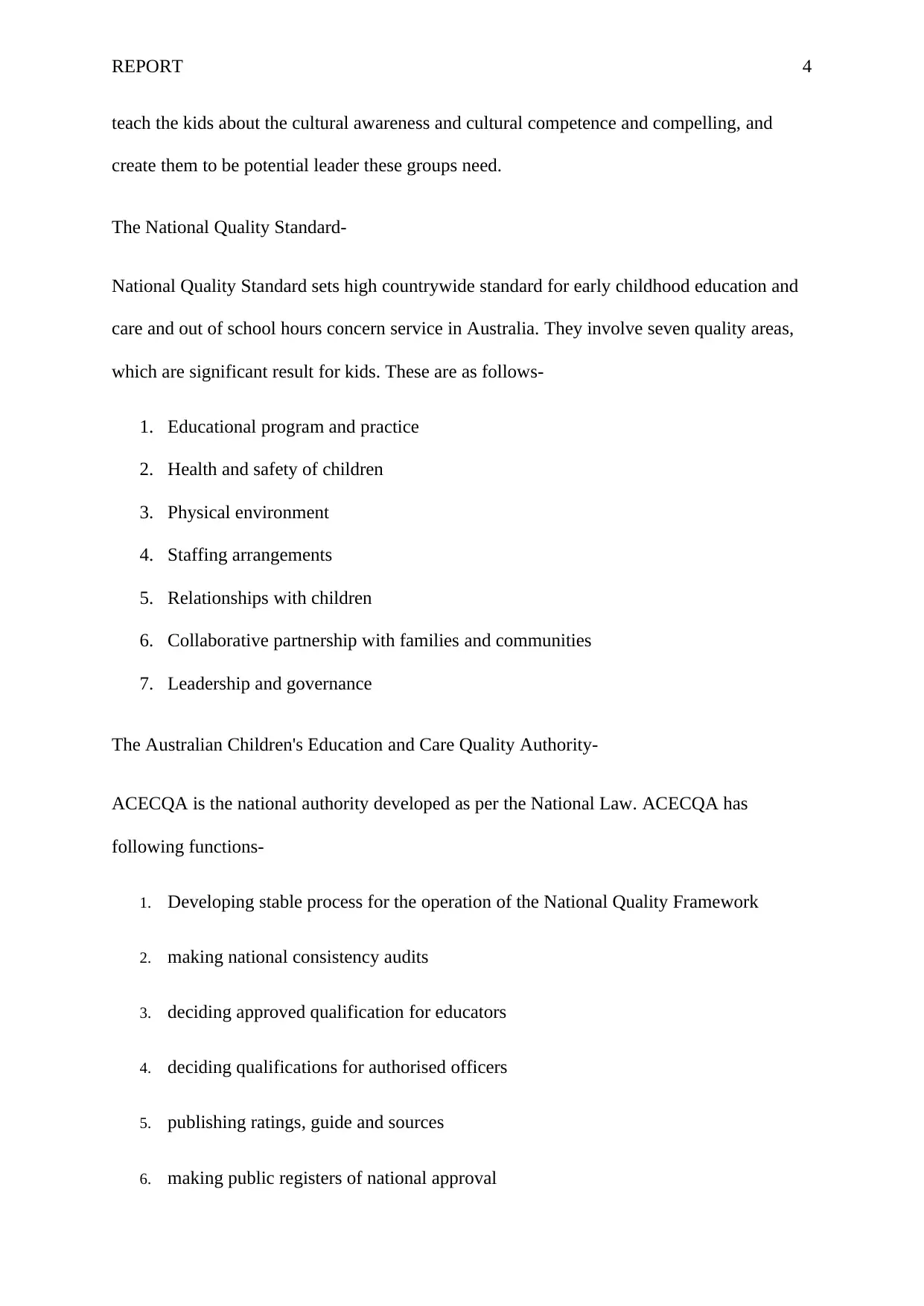
REPORT 4
teach the kids about the cultural awareness and cultural competence and compelling, and
create them to be potential leader these groups need.
The National Quality Standard-
National Quality Standard sets high countrywide standard for early childhood education and
care and out of school hours concern service in Australia. They involve seven quality areas,
which are significant result for kids. These are as follows-
1. Educational program and practice
2. Health and safety of children
3. Physical environment
4. Staffing arrangements
5. Relationships with children
6. Collaborative partnership with families and communities
7. Leadership and governance
The Australian Children's Education and Care Quality Authority-
ACECQA is the national authority developed as per the National Law. ACECQA has
following functions-
1. Developing stable process for the operation of the National Quality Framework
2. making national consistency audits
3. deciding approved qualification for educators
4. deciding qualifications for authorised officers
5. publishing ratings, guide and sources
6. making public registers of national approval
teach the kids about the cultural awareness and cultural competence and compelling, and
create them to be potential leader these groups need.
The National Quality Standard-
National Quality Standard sets high countrywide standard for early childhood education and
care and out of school hours concern service in Australia. They involve seven quality areas,
which are significant result for kids. These are as follows-
1. Educational program and practice
2. Health and safety of children
3. Physical environment
4. Staffing arrangements
5. Relationships with children
6. Collaborative partnership with families and communities
7. Leadership and governance
The Australian Children's Education and Care Quality Authority-
ACECQA is the national authority developed as per the National Law. ACECQA has
following functions-
1. Developing stable process for the operation of the National Quality Framework
2. making national consistency audits
3. deciding approved qualification for educators
4. deciding qualifications for authorised officers
5. publishing ratings, guide and sources
6. making public registers of national approval
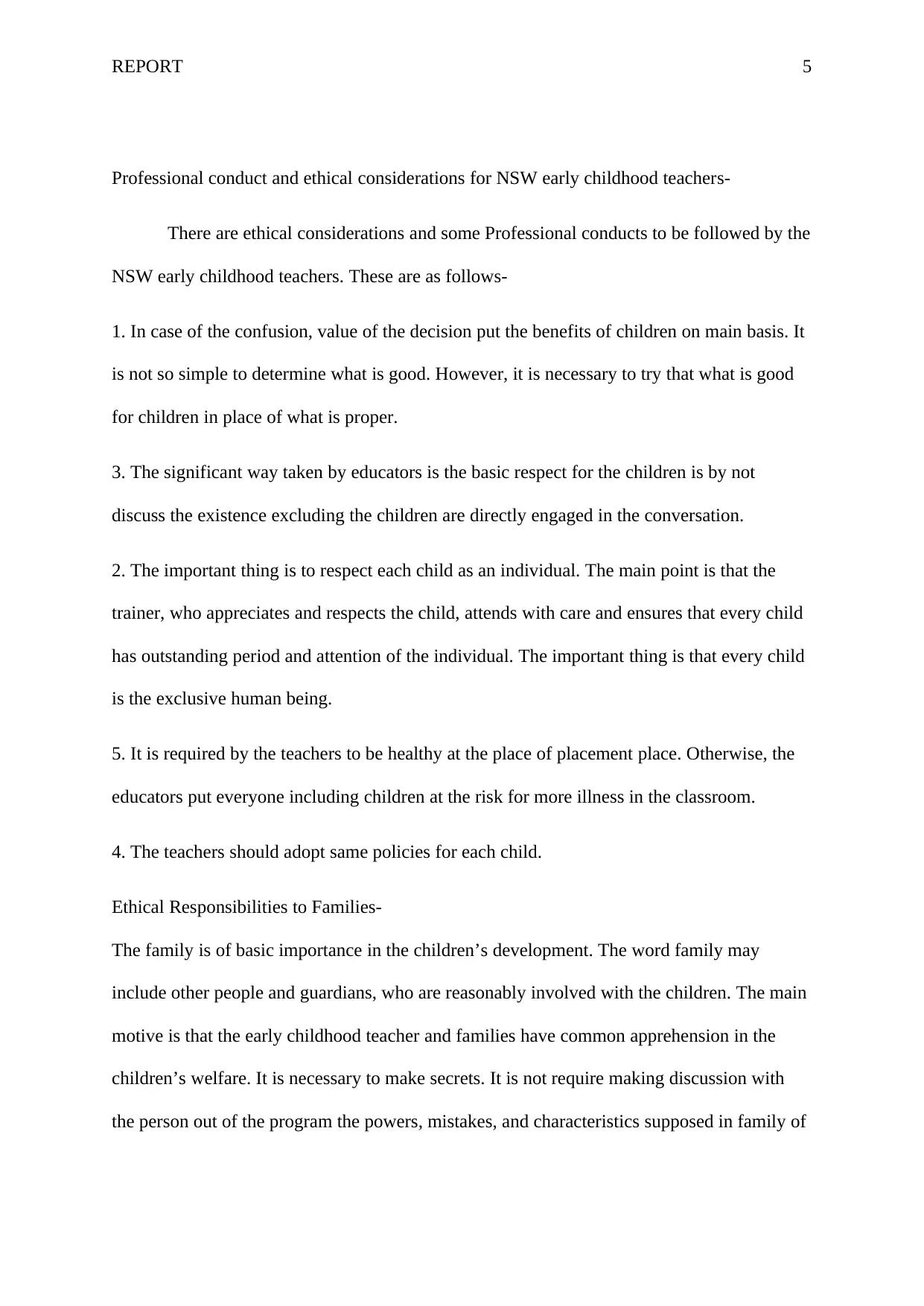
REPORT 5
Professional conduct and ethical considerations for NSW early childhood teachers-
There are ethical considerations and some Professional conducts to be followed by the
NSW early childhood teachers. These are as follows-
1. In case of the confusion, value of the decision put the benefits of children on main basis. It
is not so simple to determine what is good. However, it is necessary to try that what is good
for children in place of what is proper.
3. The significant way taken by educators is the basic respect for the children is by not
discuss the existence excluding the children are directly engaged in the conversation.
2. The important thing is to respect each child as an individual. The main point is that the
trainer, who appreciates and respects the child, attends with care and ensures that every child
has outstanding period and attention of the individual. The important thing is that every child
is the exclusive human being.
5. It is required by the teachers to be healthy at the place of placement place. Otherwise, the
educators put everyone including children at the risk for more illness in the classroom.
4. The teachers should adopt same policies for each child.
Ethical Responsibilities to Families-
The family is of basic importance in the children’s development. The word family may
include other people and guardians, who are reasonably involved with the children. The main
motive is that the early childhood teacher and families have common apprehension in the
children’s welfare. It is necessary to make secrets. It is not require making discussion with
the person out of the program the powers, mistakes, and characteristics supposed in family of
Professional conduct and ethical considerations for NSW early childhood teachers-
There are ethical considerations and some Professional conducts to be followed by the
NSW early childhood teachers. These are as follows-
1. In case of the confusion, value of the decision put the benefits of children on main basis. It
is not so simple to determine what is good. However, it is necessary to try that what is good
for children in place of what is proper.
3. The significant way taken by educators is the basic respect for the children is by not
discuss the existence excluding the children are directly engaged in the conversation.
2. The important thing is to respect each child as an individual. The main point is that the
trainer, who appreciates and respects the child, attends with care and ensures that every child
has outstanding period and attention of the individual. The important thing is that every child
is the exclusive human being.
5. It is required by the teachers to be healthy at the place of placement place. Otherwise, the
educators put everyone including children at the risk for more illness in the classroom.
4. The teachers should adopt same policies for each child.
Ethical Responsibilities to Families-
The family is of basic importance in the children’s development. The word family may
include other people and guardians, who are reasonably involved with the children. The main
motive is that the early childhood teacher and families have common apprehension in the
children’s welfare. It is necessary to make secrets. It is not require making discussion with
the person out of the program the powers, mistakes, and characteristics supposed in family of
⊘ This is a preview!⊘
Do you want full access?
Subscribe today to unlock all pages.

Trusted by 1+ million students worldwide
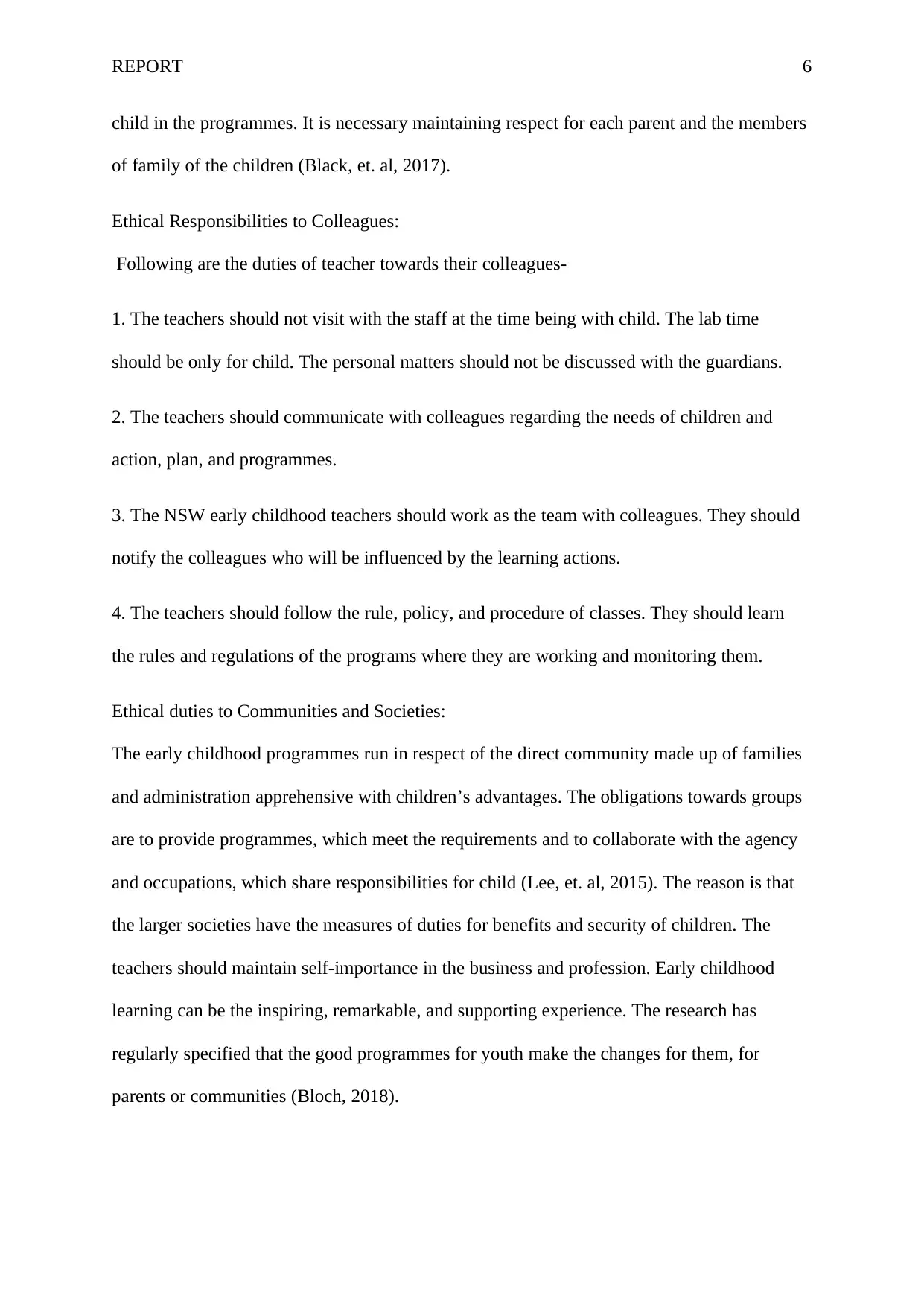
REPORT 6
child in the programmes. It is necessary maintaining respect for each parent and the members
of family of the children (Black, et. al, 2017).
Ethical Responsibilities to Colleagues:
Following are the duties of teacher towards their colleagues-
1. The teachers should not visit with the staff at the time being with child. The lab time
should be only for child. The personal matters should not be discussed with the guardians.
2. The teachers should communicate with colleagues regarding the needs of children and
action, plan, and programmes.
3. The NSW early childhood teachers should work as the team with colleagues. They should
notify the colleagues who will be influenced by the learning actions.
4. The teachers should follow the rule, policy, and procedure of classes. They should learn
the rules and regulations of the programs where they are working and monitoring them.
Ethical duties to Communities and Societies:
The early childhood programmes run in respect of the direct community made up of families
and administration apprehensive with children’s advantages. The obligations towards groups
are to provide programmes, which meet the requirements and to collaborate with the agency
and occupations, which share responsibilities for child (Lee, et. al, 2015). The reason is that
the larger societies have the measures of duties for benefits and security of children. The
teachers should maintain self-importance in the business and profession. Early childhood
learning can be the inspiring, remarkable, and supporting experience. The research has
regularly specified that the good programmes for youth make the changes for them, for
parents or communities (Bloch, 2018).
child in the programmes. It is necessary maintaining respect for each parent and the members
of family of the children (Black, et. al, 2017).
Ethical Responsibilities to Colleagues:
Following are the duties of teacher towards their colleagues-
1. The teachers should not visit with the staff at the time being with child. The lab time
should be only for child. The personal matters should not be discussed with the guardians.
2. The teachers should communicate with colleagues regarding the needs of children and
action, plan, and programmes.
3. The NSW early childhood teachers should work as the team with colleagues. They should
notify the colleagues who will be influenced by the learning actions.
4. The teachers should follow the rule, policy, and procedure of classes. They should learn
the rules and regulations of the programs where they are working and monitoring them.
Ethical duties to Communities and Societies:
The early childhood programmes run in respect of the direct community made up of families
and administration apprehensive with children’s advantages. The obligations towards groups
are to provide programmes, which meet the requirements and to collaborate with the agency
and occupations, which share responsibilities for child (Lee, et. al, 2015). The reason is that
the larger societies have the measures of duties for benefits and security of children. The
teachers should maintain self-importance in the business and profession. Early childhood
learning can be the inspiring, remarkable, and supporting experience. The research has
regularly specified that the good programmes for youth make the changes for them, for
parents or communities (Bloch, 2018).
Paraphrase This Document
Need a fresh take? Get an instant paraphrase of this document with our AI Paraphraser
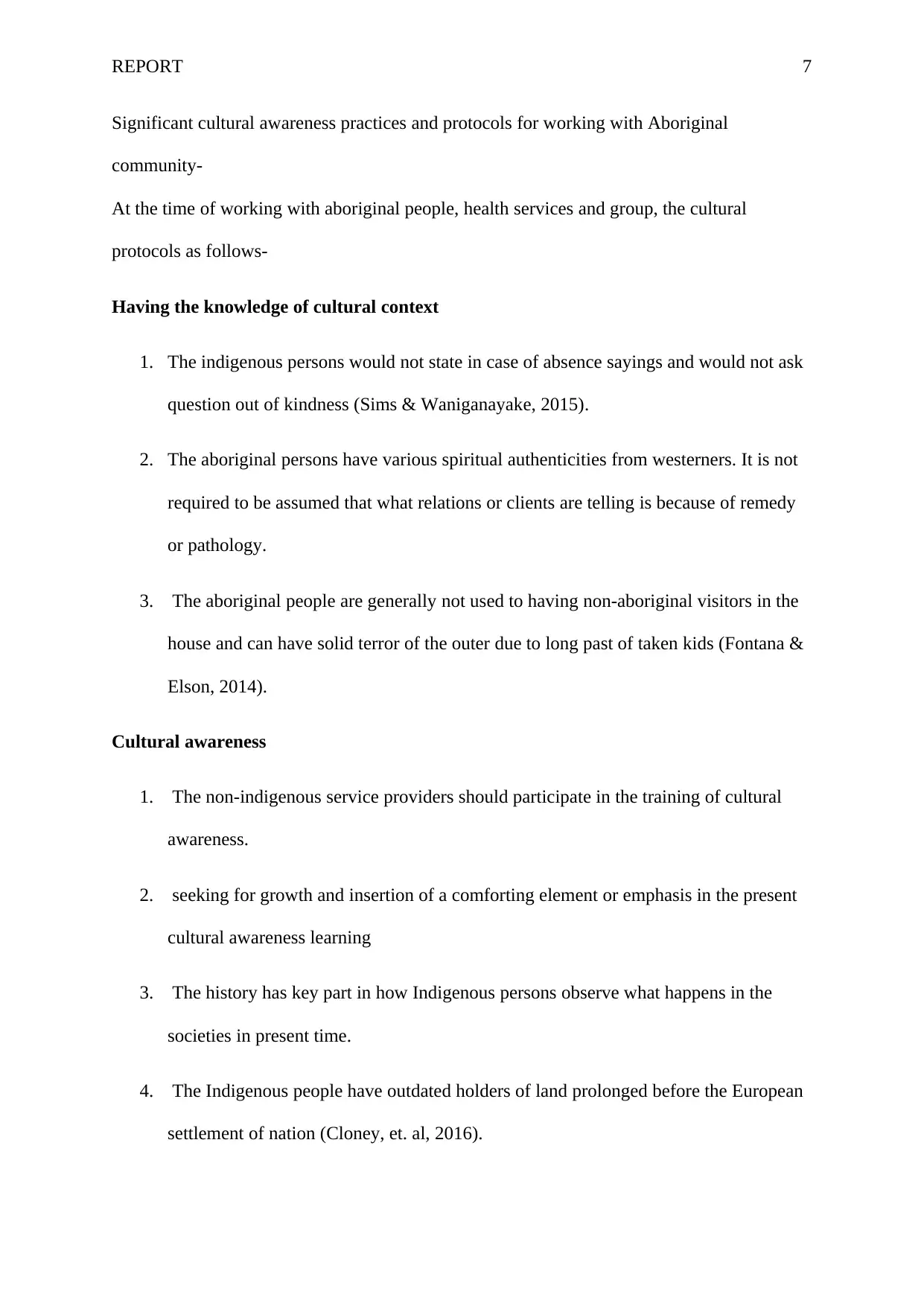
REPORT 7
Significant cultural awareness practices and protocols for working with Aboriginal
community-
At the time of working with aboriginal people, health services and group, the cultural
protocols as follows-
Having the knowledge of cultural context
1. The indigenous persons would not state in case of absence sayings and would not ask
question out of kindness (Sims & Waniganayake, 2015).
2. The aboriginal persons have various spiritual authenticities from westerners. It is not
required to be assumed that what relations or clients are telling is because of remedy
or pathology.
3. The aboriginal people are generally not used to having non-aboriginal visitors in the
house and can have solid terror of the outer due to long past of taken kids (Fontana &
Elson, 2014).
Cultural awareness
1. The non-indigenous service providers should participate in the training of cultural
awareness.
2. seeking for growth and insertion of a comforting element or emphasis in the present
cultural awareness learning
3. The history has key part in how Indigenous persons observe what happens in the
societies in present time.
4. The Indigenous people have outdated holders of land prolonged before the European
settlement of nation (Cloney, et. al, 2016).
Significant cultural awareness practices and protocols for working with Aboriginal
community-
At the time of working with aboriginal people, health services and group, the cultural
protocols as follows-
Having the knowledge of cultural context
1. The indigenous persons would not state in case of absence sayings and would not ask
question out of kindness (Sims & Waniganayake, 2015).
2. The aboriginal persons have various spiritual authenticities from westerners. It is not
required to be assumed that what relations or clients are telling is because of remedy
or pathology.
3. The aboriginal people are generally not used to having non-aboriginal visitors in the
house and can have solid terror of the outer due to long past of taken kids (Fontana &
Elson, 2014).
Cultural awareness
1. The non-indigenous service providers should participate in the training of cultural
awareness.
2. seeking for growth and insertion of a comforting element or emphasis in the present
cultural awareness learning
3. The history has key part in how Indigenous persons observe what happens in the
societies in present time.
4. The Indigenous people have outdated holders of land prolonged before the European
settlement of nation (Cloney, et. al, 2016).
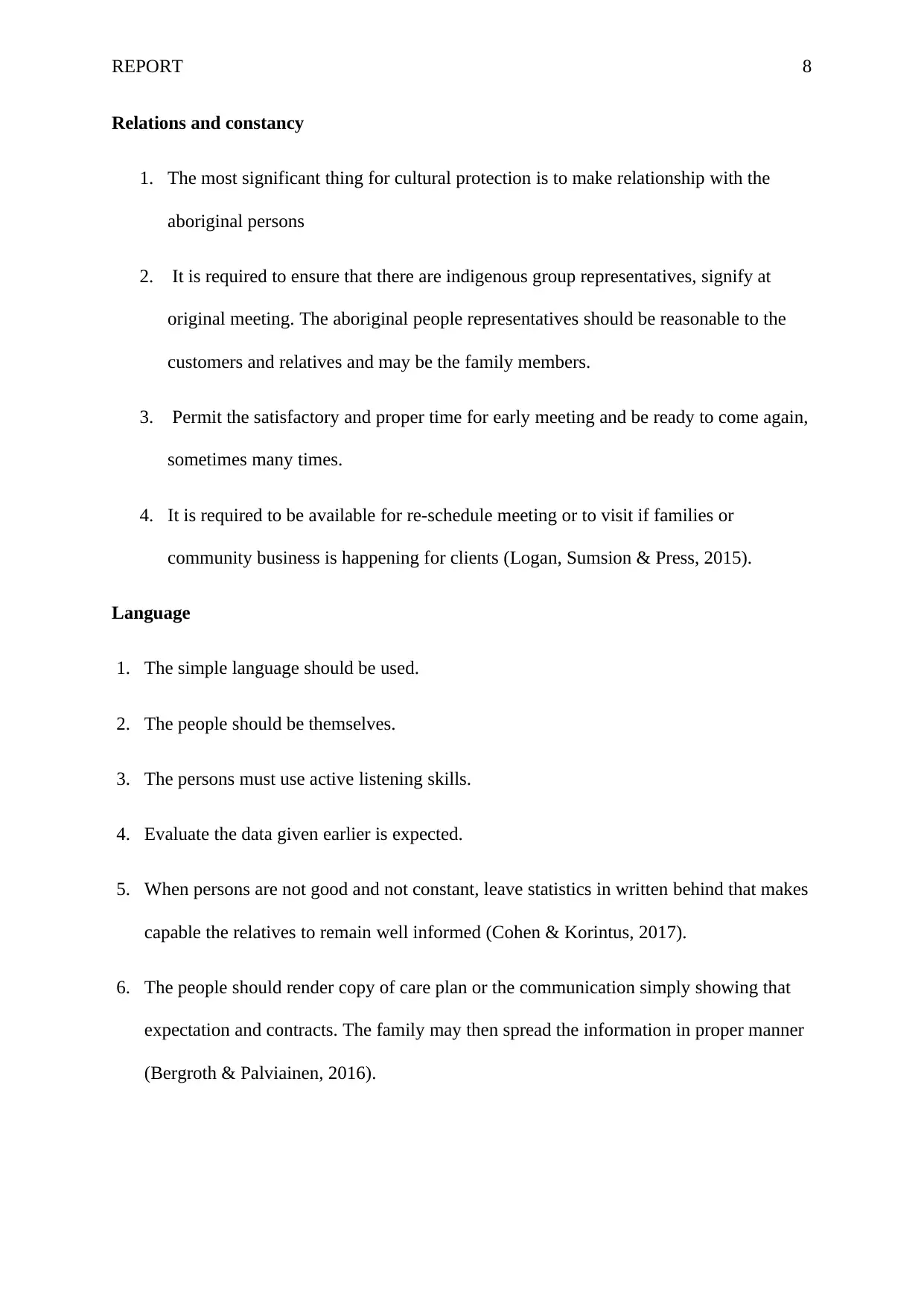
REPORT 8
Relations and constancy
1. The most significant thing for cultural protection is to make relationship with the
aboriginal persons
2. It is required to ensure that there are indigenous group representatives, signify at
original meeting. The aboriginal people representatives should be reasonable to the
customers and relatives and may be the family members.
3. Permit the satisfactory and proper time for early meeting and be ready to come again,
sometimes many times.
4. It is required to be available for re-schedule meeting or to visit if families or
community business is happening for clients (Logan, Sumsion & Press, 2015).
Language
1. The simple language should be used.
2. The people should be themselves.
3. The persons must use active listening skills.
4. Evaluate the data given earlier is expected.
5. When persons are not good and not constant, leave statistics in written behind that makes
capable the relatives to remain well informed (Cohen & Korintus, 2017).
6. The people should render copy of care plan or the communication simply showing that
expectation and contracts. The family may then spread the information in proper manner
(Bergroth & Palviainen, 2016).
Relations and constancy
1. The most significant thing for cultural protection is to make relationship with the
aboriginal persons
2. It is required to ensure that there are indigenous group representatives, signify at
original meeting. The aboriginal people representatives should be reasonable to the
customers and relatives and may be the family members.
3. Permit the satisfactory and proper time for early meeting and be ready to come again,
sometimes many times.
4. It is required to be available for re-schedule meeting or to visit if families or
community business is happening for clients (Logan, Sumsion & Press, 2015).
Language
1. The simple language should be used.
2. The people should be themselves.
3. The persons must use active listening skills.
4. Evaluate the data given earlier is expected.
5. When persons are not good and not constant, leave statistics in written behind that makes
capable the relatives to remain well informed (Cohen & Korintus, 2017).
6. The people should render copy of care plan or the communication simply showing that
expectation and contracts. The family may then spread the information in proper manner
(Bergroth & Palviainen, 2016).
⊘ This is a preview!⊘
Do you want full access?
Subscribe today to unlock all pages.

Trusted by 1+ million students worldwide
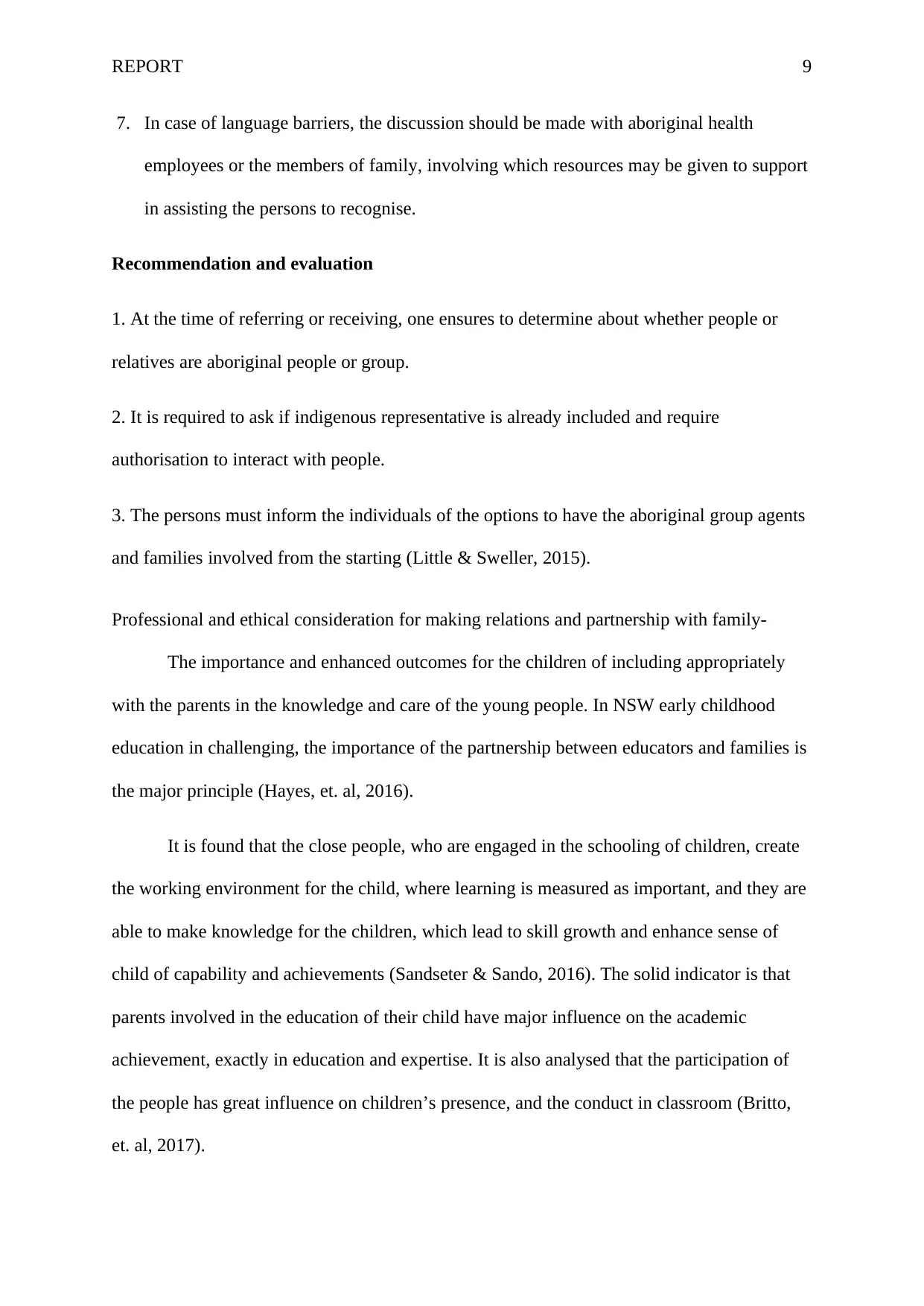
REPORT 9
7. In case of language barriers, the discussion should be made with aboriginal health
employees or the members of family, involving which resources may be given to support
in assisting the persons to recognise.
Recommendation and evaluation
1. At the time of referring or receiving, one ensures to determine about whether people or
relatives are aboriginal people or group.
2. It is required to ask if indigenous representative is already included and require
authorisation to interact with people.
3. The persons must inform the individuals of the options to have the aboriginal group agents
and families involved from the starting (Little & Sweller, 2015).
Professional and ethical consideration for making relations and partnership with family-
The importance and enhanced outcomes for the children of including appropriately
with the parents in the knowledge and care of the young people. In NSW early childhood
education in challenging, the importance of the partnership between educators and families is
the major principle (Hayes, et. al, 2016).
It is found that the close people, who are engaged in the schooling of children, create
the working environment for the child, where learning is measured as important, and they are
able to make knowledge for the children, which lead to skill growth and enhance sense of
child of capability and achievements (Sandseter & Sando, 2016). The solid indicator is that
parents involved in the education of their child have major influence on the academic
achievement, exactly in education and expertise. It is also analysed that the participation of
the people has great influence on children’s presence, and the conduct in classroom (Britto,
et. al, 2017).
7. In case of language barriers, the discussion should be made with aboriginal health
employees or the members of family, involving which resources may be given to support
in assisting the persons to recognise.
Recommendation and evaluation
1. At the time of referring or receiving, one ensures to determine about whether people or
relatives are aboriginal people or group.
2. It is required to ask if indigenous representative is already included and require
authorisation to interact with people.
3. The persons must inform the individuals of the options to have the aboriginal group agents
and families involved from the starting (Little & Sweller, 2015).
Professional and ethical consideration for making relations and partnership with family-
The importance and enhanced outcomes for the children of including appropriately
with the parents in the knowledge and care of the young people. In NSW early childhood
education in challenging, the importance of the partnership between educators and families is
the major principle (Hayes, et. al, 2016).
It is found that the close people, who are engaged in the schooling of children, create
the working environment for the child, where learning is measured as important, and they are
able to make knowledge for the children, which lead to skill growth and enhance sense of
child of capability and achievements (Sandseter & Sando, 2016). The solid indicator is that
parents involved in the education of their child have major influence on the academic
achievement, exactly in education and expertise. It is also analysed that the participation of
the people has great influence on children’s presence, and the conduct in classroom (Britto,
et. al, 2017).
Paraphrase This Document
Need a fresh take? Get an instant paraphrase of this document with our AI Paraphraser
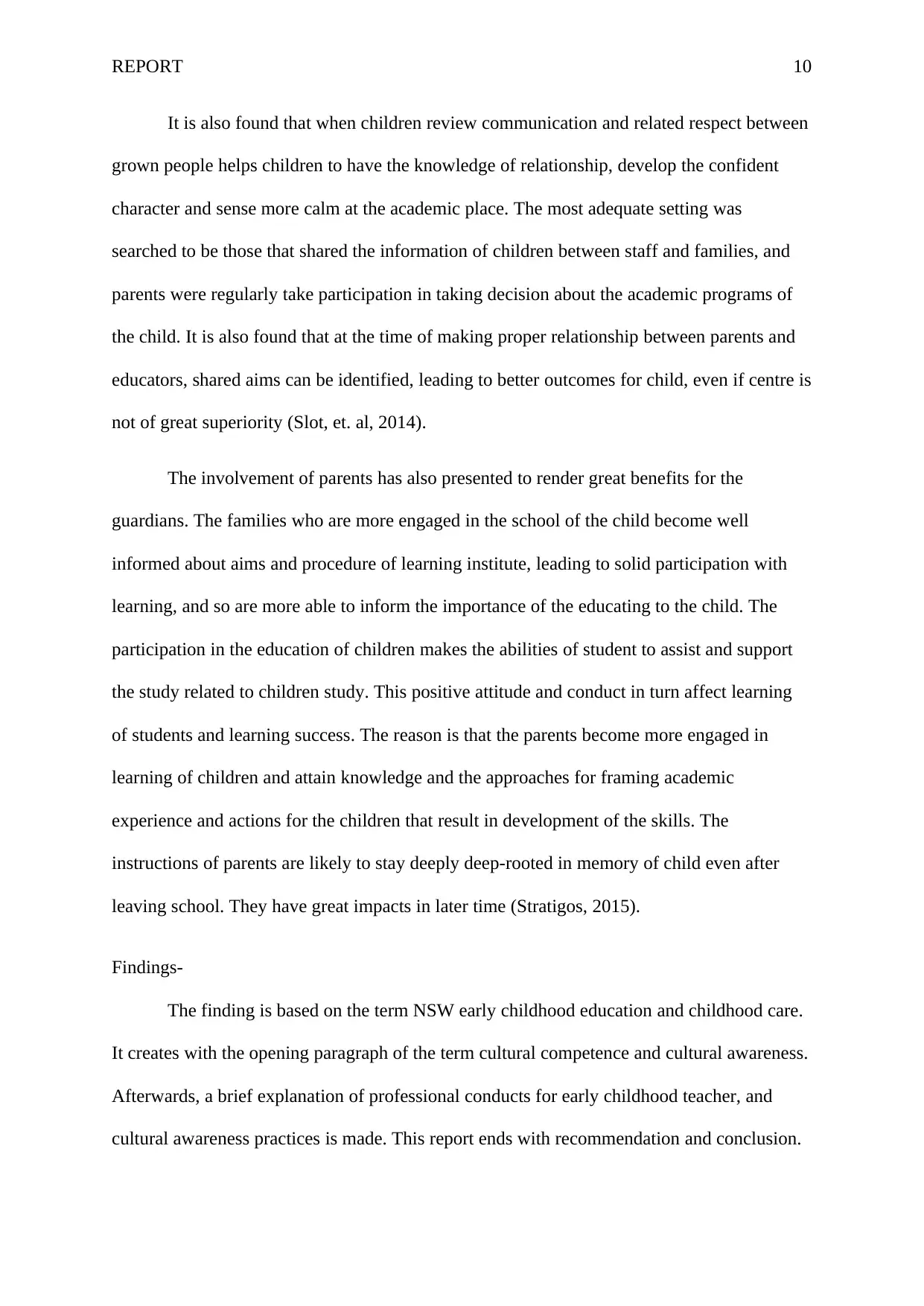
REPORT 10
It is also found that when children review communication and related respect between
grown people helps children to have the knowledge of relationship, develop the confident
character and sense more calm at the academic place. The most adequate setting was
searched to be those that shared the information of children between staff and families, and
parents were regularly take participation in taking decision about the academic programs of
the child. It is also found that at the time of making proper relationship between parents and
educators, shared aims can be identified, leading to better outcomes for child, even if centre is
not of great superiority (Slot, et. al, 2014).
The involvement of parents has also presented to render great benefits for the
guardians. The families who are more engaged in the school of the child become well
informed about aims and procedure of learning institute, leading to solid participation with
learning, and so are more able to inform the importance of the educating to the child. The
participation in the education of children makes the abilities of student to assist and support
the study related to children study. This positive attitude and conduct in turn affect learning
of students and learning success. The reason is that the parents become more engaged in
learning of children and attain knowledge and the approaches for framing academic
experience and actions for the children that result in development of the skills. The
instructions of parents are likely to stay deeply deep-rooted in memory of child even after
leaving school. They have great impacts in later time (Stratigos, 2015).
Findings-
The finding is based on the term NSW early childhood education and childhood care.
It creates with the opening paragraph of the term cultural competence and cultural awareness.
Afterwards, a brief explanation of professional conducts for early childhood teacher, and
cultural awareness practices is made. This report ends with recommendation and conclusion.
It is also found that when children review communication and related respect between
grown people helps children to have the knowledge of relationship, develop the confident
character and sense more calm at the academic place. The most adequate setting was
searched to be those that shared the information of children between staff and families, and
parents were regularly take participation in taking decision about the academic programs of
the child. It is also found that at the time of making proper relationship between parents and
educators, shared aims can be identified, leading to better outcomes for child, even if centre is
not of great superiority (Slot, et. al, 2014).
The involvement of parents has also presented to render great benefits for the
guardians. The families who are more engaged in the school of the child become well
informed about aims and procedure of learning institute, leading to solid participation with
learning, and so are more able to inform the importance of the educating to the child. The
participation in the education of children makes the abilities of student to assist and support
the study related to children study. This positive attitude and conduct in turn affect learning
of students and learning success. The reason is that the parents become more engaged in
learning of children and attain knowledge and the approaches for framing academic
experience and actions for the children that result in development of the skills. The
instructions of parents are likely to stay deeply deep-rooted in memory of child even after
leaving school. They have great impacts in later time (Stratigos, 2015).
Findings-
The finding is based on the term NSW early childhood education and childhood care.
It creates with the opening paragraph of the term cultural competence and cultural awareness.
Afterwards, a brief explanation of professional conducts for early childhood teacher, and
cultural awareness practices is made. This report ends with recommendation and conclusion.
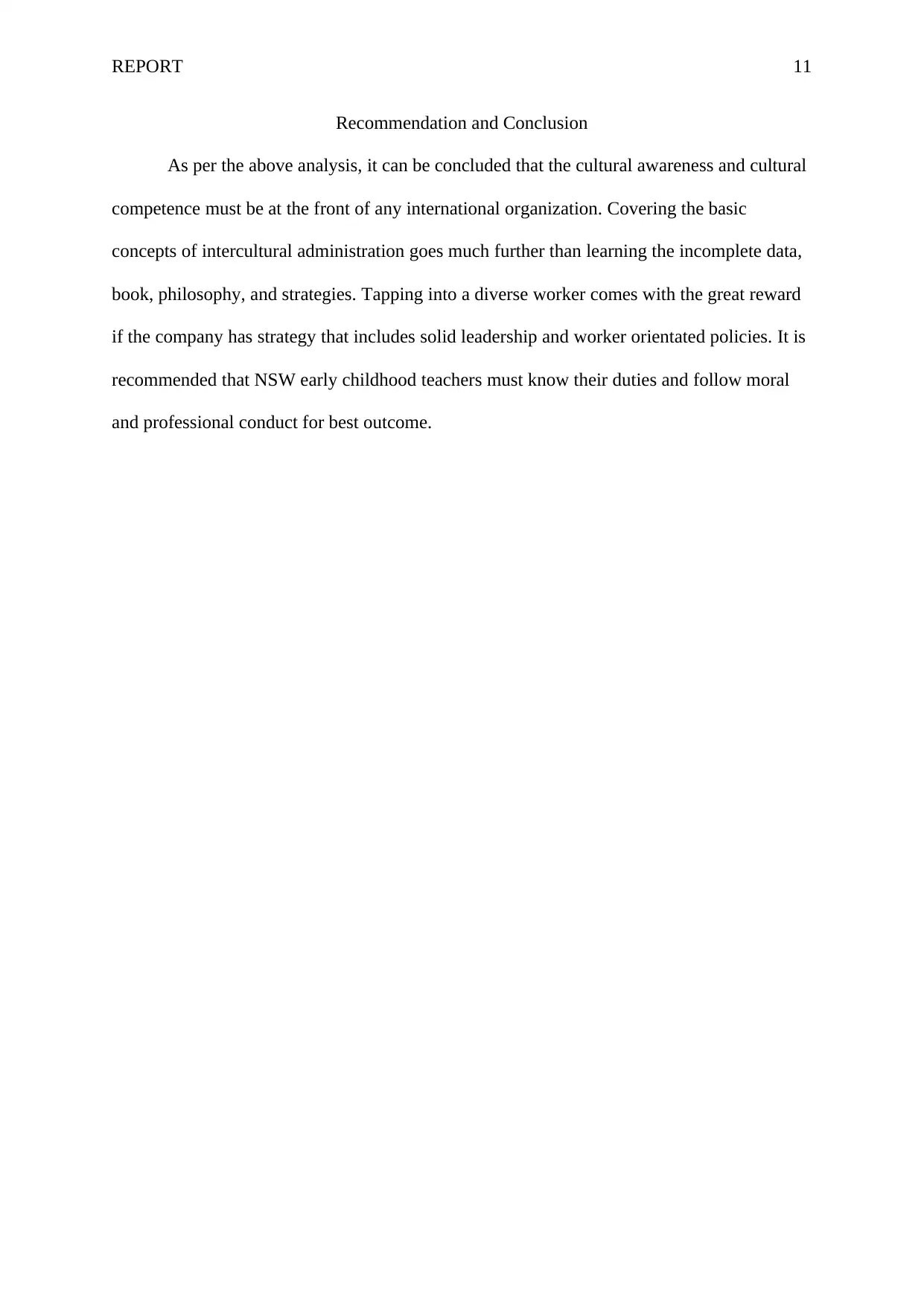
REPORT 11
Recommendation and Conclusion
As per the above analysis, it can be concluded that the cultural awareness and cultural
competence must be at the front of any international organization. Covering the basic
concepts of intercultural administration goes much further than learning the incomplete data,
book, philosophy, and strategies. Tapping into a diverse worker comes with the great reward
if the company has strategy that includes solid leadership and worker orientated policies. It is
recommended that NSW early childhood teachers must know their duties and follow moral
and professional conduct for best outcome.
Recommendation and Conclusion
As per the above analysis, it can be concluded that the cultural awareness and cultural
competence must be at the front of any international organization. Covering the basic
concepts of intercultural administration goes much further than learning the incomplete data,
book, philosophy, and strategies. Tapping into a diverse worker comes with the great reward
if the company has strategy that includes solid leadership and worker orientated policies. It is
recommended that NSW early childhood teachers must know their duties and follow moral
and professional conduct for best outcome.
⊘ This is a preview!⊘
Do you want full access?
Subscribe today to unlock all pages.

Trusted by 1+ million students worldwide
1 out of 16
Related Documents
Your All-in-One AI-Powered Toolkit for Academic Success.
+13062052269
info@desklib.com
Available 24*7 on WhatsApp / Email
![[object Object]](/_next/static/media/star-bottom.7253800d.svg)
Unlock your academic potential
Copyright © 2020–2026 A2Z Services. All Rights Reserved. Developed and managed by ZUCOL.





![Diploma in Early Childhood Education Assignment - [University Name]](/_next/image/?url=https%3A%2F%2Fdesklib.com%2Fmedia%2Fimages%2Fim%2F9ec57b9d282b457796267c3de395758c.jpg&w=256&q=75)